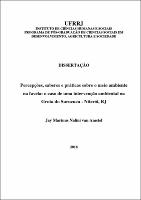Use este identificador para citar ou linkar para este item:
http://rima110.im.ufrrj.br:8080/jspui/handle/20.500.14407/12530Registro completo de metadados
| Campo DC | Valor | Idioma |
|---|---|---|
| dc.creator | Amstel, Jay Marinus Nalini van | |
| dc.date.accessioned | 2023-11-19T23:04:54Z | - |
| dc.date.available | 2023-11-19T23:04:54Z | - |
| dc.date.issued | 2018-03-21 | |
| dc.identifier.citation | AMSTEL, Jay Marinus Nalini van. Percepções, saberes e práticas sobre o meio ambiente na favela: o caso de uma intervenção ambiental na Grota do Surucucu, Niterói, RJ. 2018. 157 f. Dissertação (Mestrado de Ciências Sociais em Desenvolvimento, Agricultura e Sociedade) - Instituto de Ciências Humanas e Sociais, Universidade Federal Rural do Rio de Janeiro, Rio de Janeiro, 2018. | por |
| dc.identifier.uri | https://rima.ufrrj.br/jspui/handle/20.500.14407/12530 | - |
| dc.description.abstract | The present research seeks to understand the environmental issues experienced by the residents of the community of Grota do Surucucu, Niterói-RJ, based on interactions promoted by the action of an NGO (Ecomagente Project). It seeks to list a repertoire of relationships between residents and interveners, which involves frictions between ideas, values and interests, using the notions of “interface” and “epistemic communities” of Long (2001). With a focus on social actors, the research reveals the different meanings and practices about the environment that imply relationships of sociability specific to a livelihood. The focus of this analysis is oriented to the cognitive content that involves the cultivation of plants and animal creations, considering how these practices are inserted in the daily life and juxtaposed in time/space with small dumps, lack of sanitary sewage, among other issues. With this, the research intends to discuss how the environmental issue is (res)signified in relation to the specificities of the slum, both by interactional processes and by the relationship of the residents with their environment. | eng |
| dc.description.sponsorship | Coordenação de Aperfeiçoamento de Pessoal de Nível Superior (CAPES, Brasil) | por |
| dc.format | application/pdf | * |
| dc.language | por | por |
| dc.publisher | Universidade Federal Rural do Rio de Janeiro | por |
| dc.rights | Acesso Aberto | por |
| dc.subject | Favelas e comunidades | por |
| dc.subject | Intervenção ambiental | por |
| dc.subject | Produção intercognitiva | por |
| dc.subject | Educação ambiental | por |
| dc.subject | Percepção ambiental | por |
| dc.subject | Slums | eng |
| dc.subject | Environmental intervention | eng |
| dc.subject | Intercognitive production | eng |
| dc.subject | Environmental education | eng |
| dc.subject | Environmental perception | eng |
| dc.title | Percepções, saberes e práticas sobre o meio ambiente na favela: o caso de uma intervenção ambiental na Grota do Surucucu, Niterói, RJ | por |
| dc.title.alternative | Perceptions, knowledge and practices about the environment in the slum: the case of an environmental intervention in Grota do Surucucu, Niterói, RJ | eng |
| dc.type | Dissertação | por |
| dc.contributor.advisor1 | Carneiro, Maria José Teixeira | |
| dc.contributor.referee1 | Schmitt, Cláudia Jobb | |
| dc.contributor.referee2 | Silva, Gláucia Oliveira da | |
| dc.creator.ID | 062.753.739-11 | por |
| dc.creator.Lattes | http://lattes.cnpq.br/4799272505002703 | por |
| dc.description.resumo | A presente pesquisa se volta para a compreensão das questões ambientais vivenciadas pelos moradores da comunidade da Grota do Surucucu, Niterói-RJ, a partir das interações promovidas pela ação de uma ONG (Projeto Ecomagente). Busca-se elencar um repertório de relações entre moradores e interventores o que envolve fricções entre ideias, valores e interesses, recorrendo para isso às noções de “interface” e de “comunidades epistêmicas” de Long (2001). Com o foco voltado para os atores sociais, a pesquisa revela os diferentes significados e práticas sobre o meio ambiente que implicam em relações de sociabilidade próprias de um modo de vida. O foco desta análise está orientado para o conteúdo cognitivo que envolve os cultivos de plantas e criações animais, considerando como essas práticas se inserem no cotidiano e se justapõem no tempo/espaço com pequenos lixões, com a falta de esgotamento sanitário, entre outras questões. Com isso a pesquisa pretende discorrer sobre como a questão ambiental é (res)significada frente às especificidades da favela, tanto por processo interacionais quanto pela relação dos moradores com seu ambiente. | por |
| dc.publisher.country | Brasil | por |
| dc.publisher.department | Instituto de Ciências Humanas e Sociais | por |
| dc.publisher.initials | UFRRJ | por |
| dc.publisher.program | Programa de Pós-Graduação em Ciências Sociais em Desenvolvimento, Agricultura e Sociedade | por |
| dc.subject.cnpq | Sociologia | por |
| dc.thumbnail.url | https://tede.ufrrj.br/retrieve/65673/2018%20-%20Jay%20Marinus%20Nalini%20van%20Amstel.pdf.jpg | * |
| dc.originais.uri | https://tede.ufrrj.br/jspui/handle/jspui/4786 | |
| dc.originais.provenance | Submitted by Jorge Silva (jorgelmsilva@ufrrj.br) on 2021-06-24T16:06:55Z No. of bitstreams: 1 2018 - Jay Marinus Nalini van Amstel.pdf: 3117044 bytes, checksum: 8d12b28664253e45210c47225c0e7cf5 (MD5) | eng |
| dc.originais.provenance | Made available in DSpace on 2021-06-24T16:06:55Z (GMT). No. of bitstreams: 1 2018 - Jay Marinus Nalini van Amstel.pdf: 3117044 bytes, checksum: 8d12b28664253e45210c47225c0e7cf5 (MD5) Previous issue date: 2018-03-21 | eng |
| Aparece nas coleções: | Mestrado em Ciências Sociais em Desenvolvimento, Agricultura e Sociedade | |
Se for cadastrado no RIMA, poderá receber informações por email.
Se ainda não tem uma conta, cadastre-se aqui!
Arquivos associados a este item:
| Arquivo | Descrição | Tamanho | Formato | |
|---|---|---|---|---|
| 2018 - Jay Marinus Nalini van Amstel.pdf | 3.04 MB | Adobe PDF |  Abrir |
Os itens no repositório estão protegidos por copyright, com todos os direitos reservados, salvo quando é indicado o contrário.

